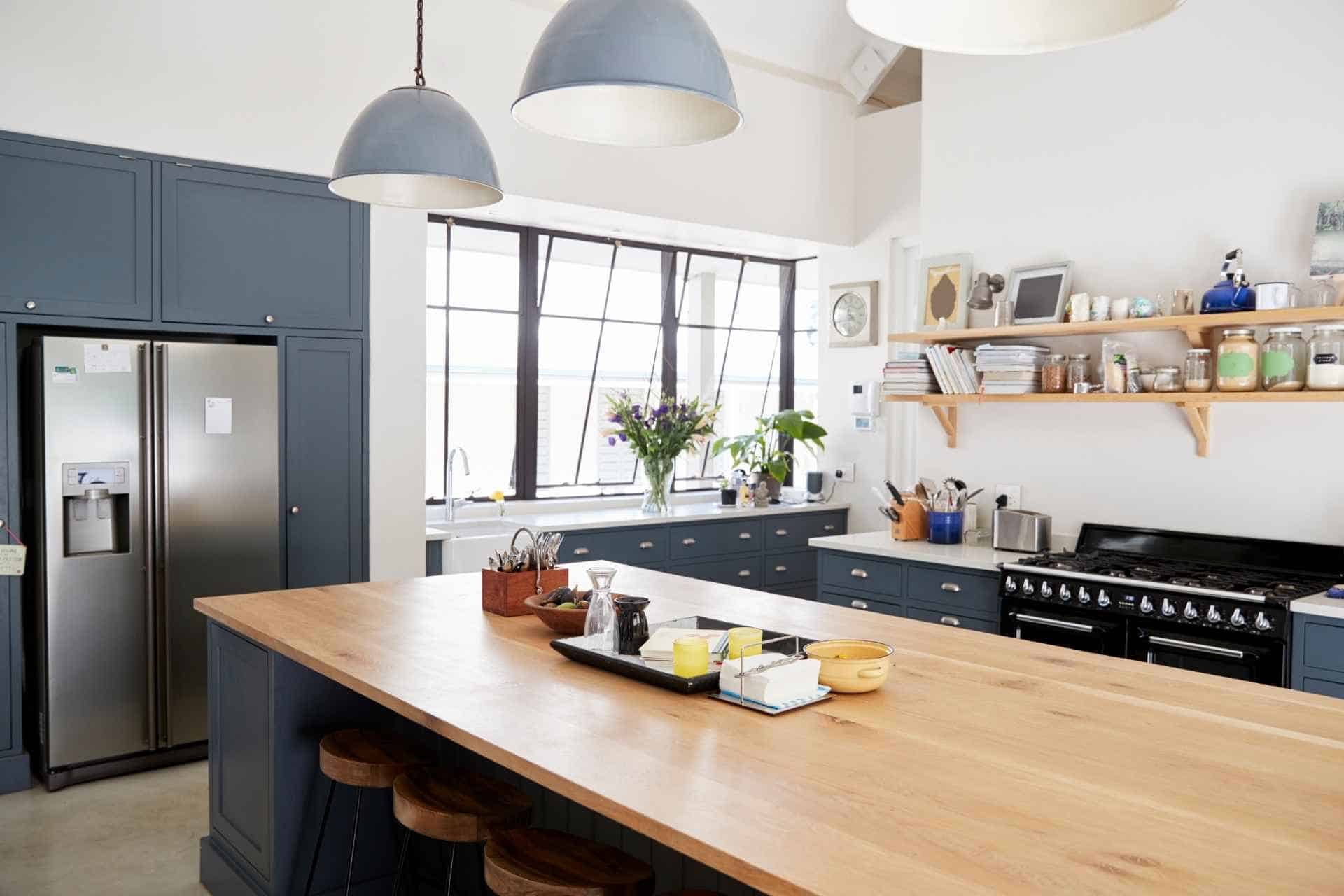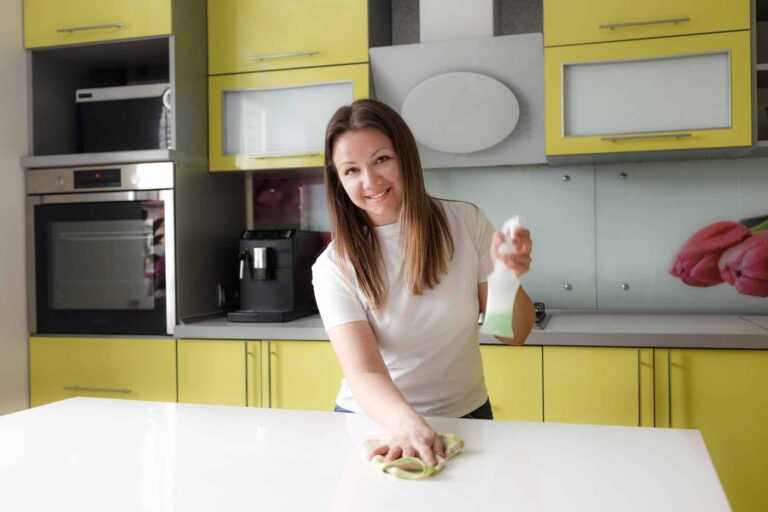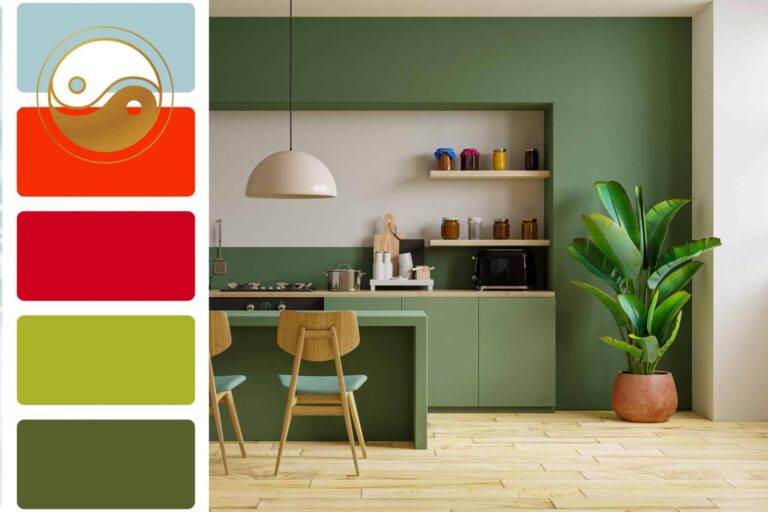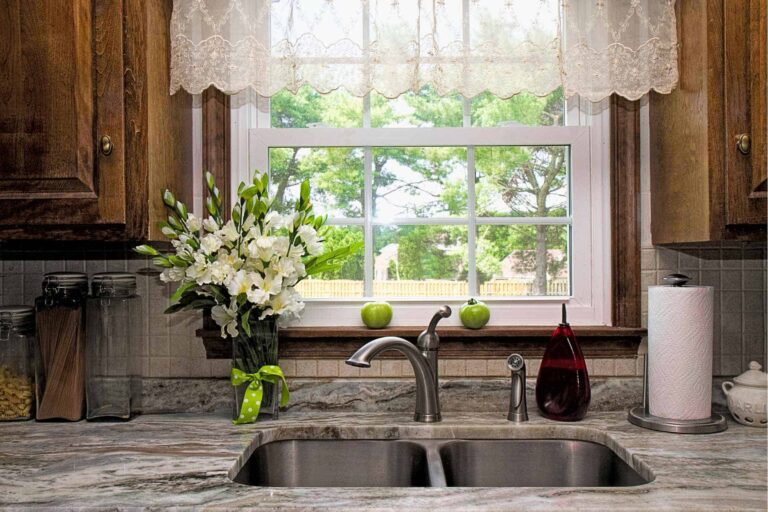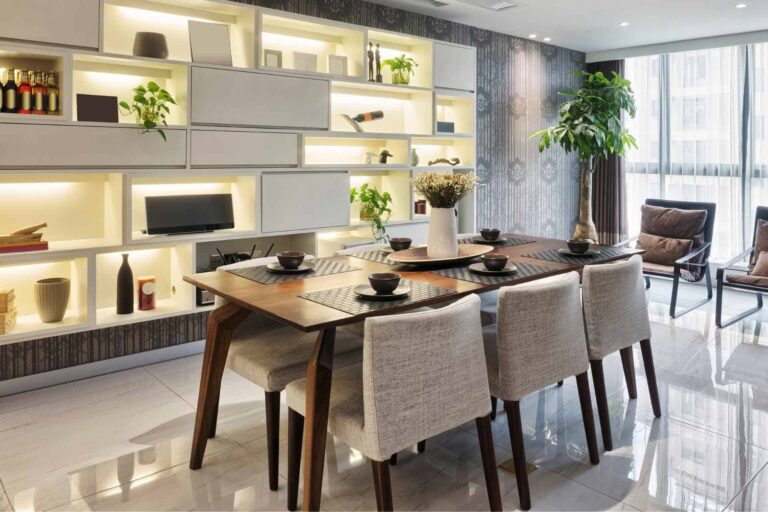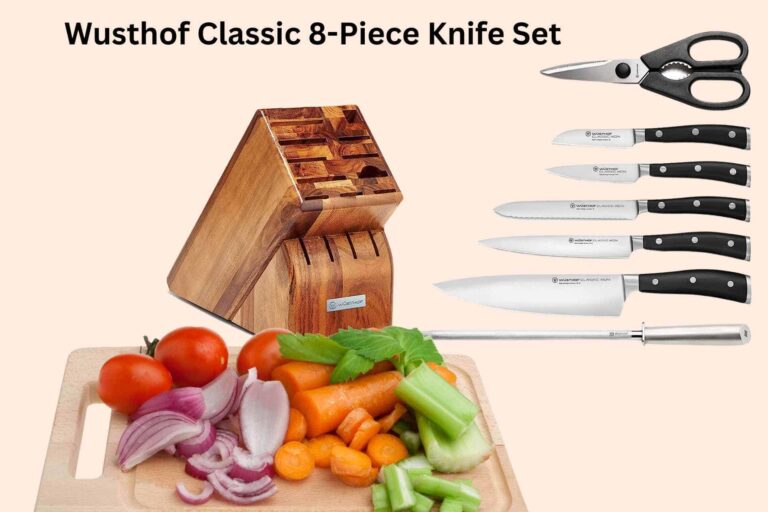Top 8 Best Kitchen Countertops for a Stylish Cooking Space
Choosing the right kitchen countertop is more than just a design decision. It significantly impacts your kitchen’s functionality and longevity. A countertop is a central workspace in any kitchen, influencing ease of food preparation, cleaning, and other kitchen tasks. Moreover, the right countertop material can withstand years of use without showing signs of wear, making it a long-term investment. The aesthetic appeal cannot be dismissed either. The countertop contributes significantly to the overall ambiance and style of your kitchen, which can influence your home’s resale value. Additionally, some materials are more environmentally friendly than others, a factor that eco-conscious homeowners might consider. Therefore, understanding the strengths and shortcomings of various materials is essential to choose the best kitchen countertop that aligns with your lifestyle, budget, aesthetic preferences, and environmental values.
8 Best Kitchen Countertops
Granite Countertops
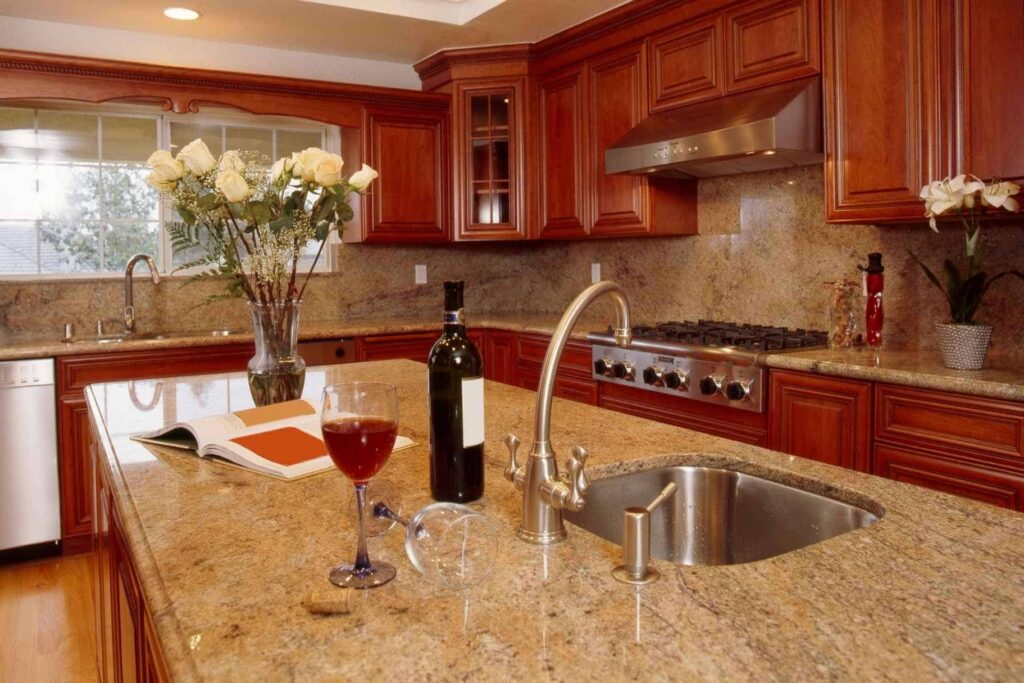
Granite countertops have long been a popular choice in kitchens due to their durability and unique aesthetics. Each slab of granite has its distinctive pattern, adding an element of luxury and richness to your kitchen. In terms of functionality, granite is heat-resistant, scratch-resistant, and, when properly sealed, resistant to staining. However, it requires periodic resealing to maintain its resistance to stains and bacteria. The cost of granite countertops is on the higher end, which could be a drawback for those on a budget. But considering its durability and timeless appeal, many homeowners find it a worthwhile investment.
Advantages and Disadvantages
On the positive side, granite countertops are incredibly durable, they can resist heat, and they don’t scratch easily. The unique and beautiful patterns of the granite can also significantly enhance the aesthetic appeal of your kitchen. On the downside, granite countertops require regular maintenance to keep them stain and bacteria resistant. They are also one of the more expensive countertop options.
How to choose the best Granite kitchen countertops
When choosing granite countertops, consider the color and pattern that will best complement your kitchen’s design. You should also look for high-quality granite and ensure it is properly sealed. It’s recommended to always use a cutting board and clean spills immediately to prevent possible damage or staining, despite granite’s toughness. And remember, while more expensive than some options, the unparalleled durability and elegance of granite can add value to your home, potentially offsetting the initial cost.
Quartz Countertops
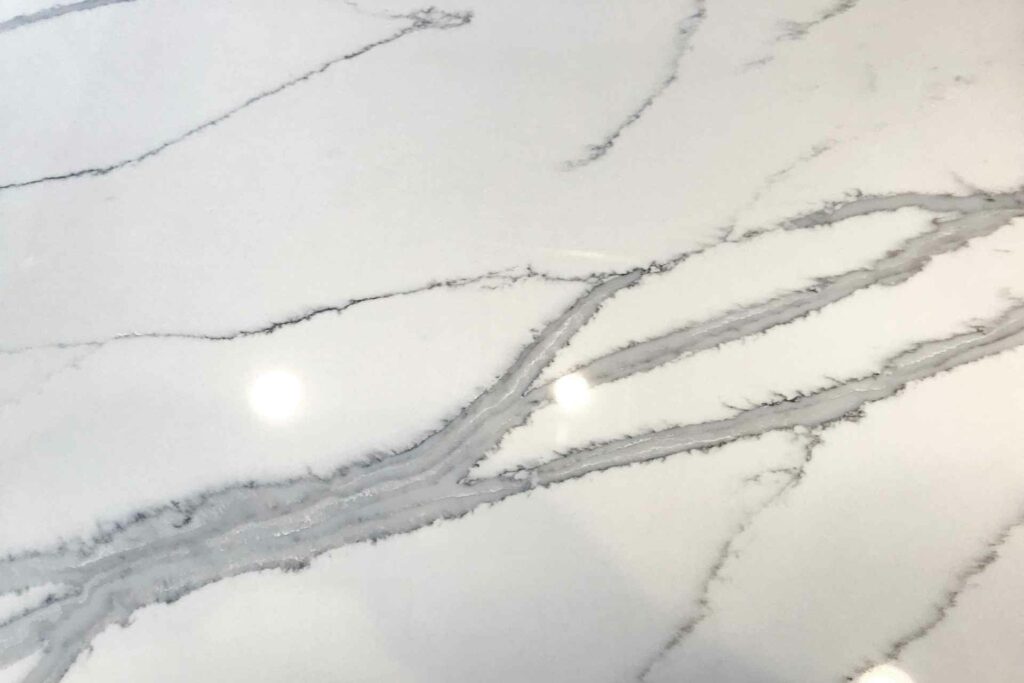
Quartz countertops are another popular choice for kitchens due to their durability and variety of design options. Unlike granite, quartz countertops are engineered, meaning they are manufactured using natural quartz crystals combined with resins. This results in a highly sturdy countertop that does not require the same level of maintenance as natural stone options.
Advantages and Disadvantages
Quartz countertops have many advantages. They are non-porous, meaning they do not need to be resealed and are resistant to stains and bacteria. This makes them a more low-maintenance option compared to granite. Additionally, because they are engineered, quartz countertops come in a wider range of colors and patterns. However, they are not as heat-resistant as granite and can be damaged by high temperatures.
How to choose the best Quartz kitchen countertops
In selecting quartz countertops, your design preferences play a significant role, given the wide range of colors and patterns available. Quality is important too, so choose a reputable manufacturer. While quartz is more forgiving than granite, using heat pads and cutting boards can help prolong its lifespan. Despite being a pricier option, the low-maintenance nature and aesthetic flexibility of quartz countertops make them a valuable addition to any kitchen.
Marble Countertops
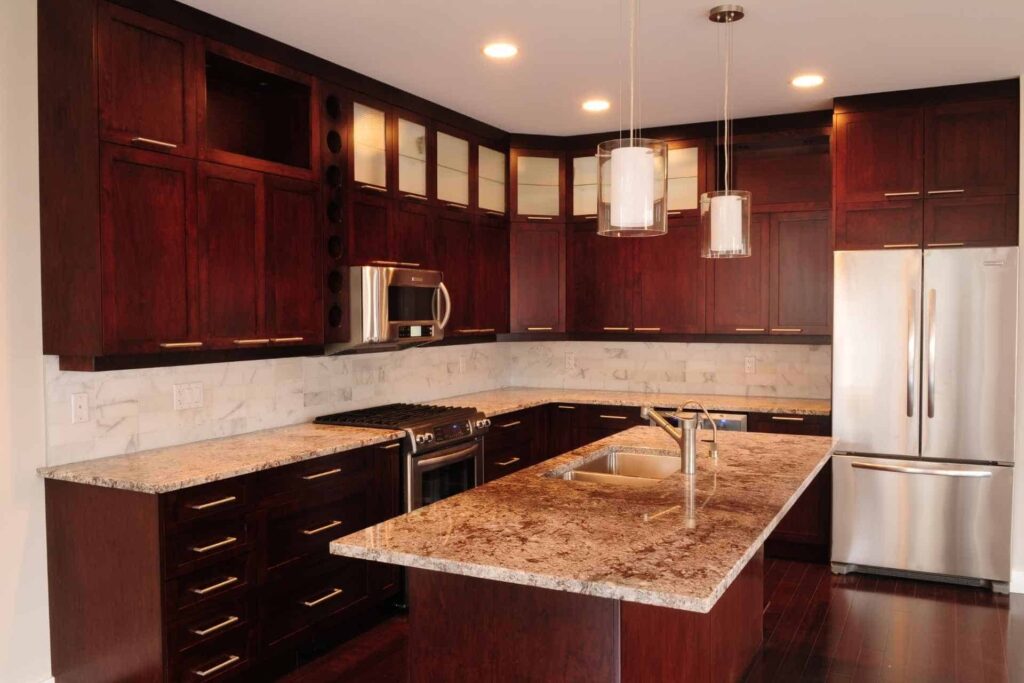
Marble countertops are renowned for their refined elegance and classic beauty. These countertops are derived from the metamorphic rock that has been used in grand structures and art throughout history.
Advantages and Disadvantages
Marble countertops provide an undeniable touch of luxury and sophistication to any kitchen. Their heat resistance makes them amenable to culinary tasks involving hot pots and pans. However, marble is porous and can easily absorb liquids, leading to potential stains. It is also susceptible to scratching and chipping compared to quartz or granite. Regular resealing can help maintain the longevity and aesthetic appeal of marble countertops.
How to choose the best Marble kitchen countertops
Selecting marble countertops involves careful consideration of color, veining patterns, and finish. As marble is a natural stone, it is available in different hues and unique veining, allowing personalization of your kitchen. Always choose high-quality marble from reputed manufacturers. While marble might demand a higher degree of maintenance and care than other materials, its timeless elegance and unique character make it a standout choice for those looking to create a kitchen with a luxurious and distinctive aesthetic.
Wooden Countertops
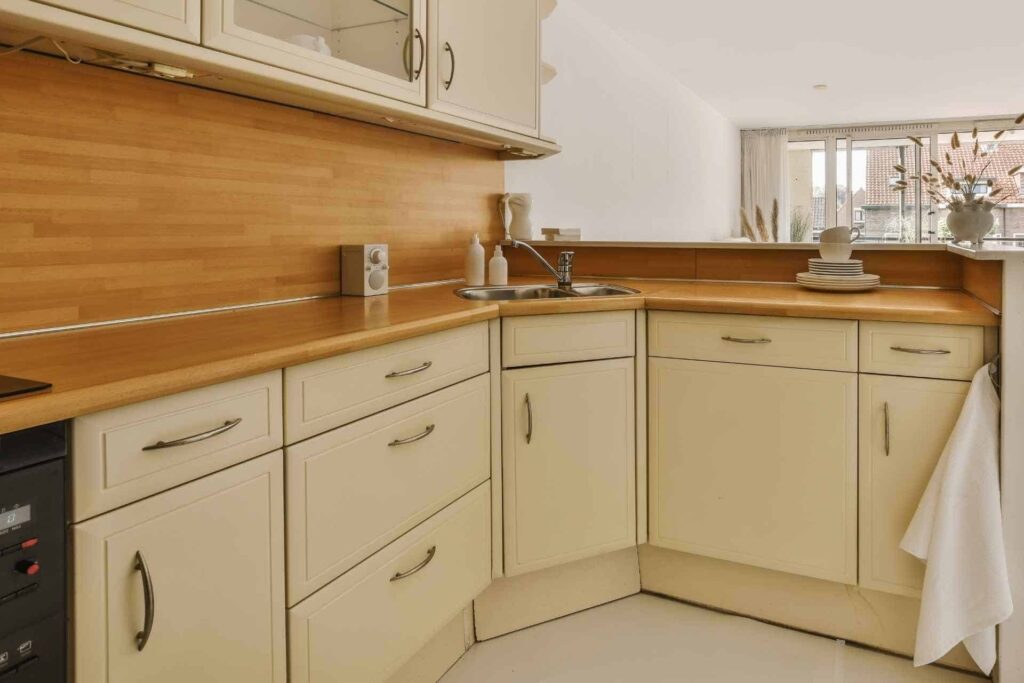
Wooden countertops, also known as butcher block countertops, bring a warm, rustic charm to your kitchen. These countertops are made from various types of wood, from hardwoods like oak and maple to exotic varieties like teak and walnut.
Advantages and Disadvantages
Wooden countertops offer a naturally beautiful and versatile aesthetic that blends well with a variety of kitchen styles, from traditional to modern. They are heat-resistant and can be re-sanded and refinished to cover any scratches or wear over time. However, they require regular sealing to avoid water damage and bacterial growth. They can also be prone to warping and scratching, and may not be the ideal choice for heavy-duty cooking.
How to choose the best Wooden kitchen countertops
When selecting wooden countertops, consider your cooking habits, the wood’s durability, and the color and grain pattern. Choose hardwoods for their toughness if you do a lot of chopping and slicing. For aesthetic appeal, consider the wood’s color and grain – these elements can greatly influence the overall look of your kitchen. Always purchase from trusted manufacturers to ensure the quality and longevity of your wooden countertop.
Stainless Steel Countertops
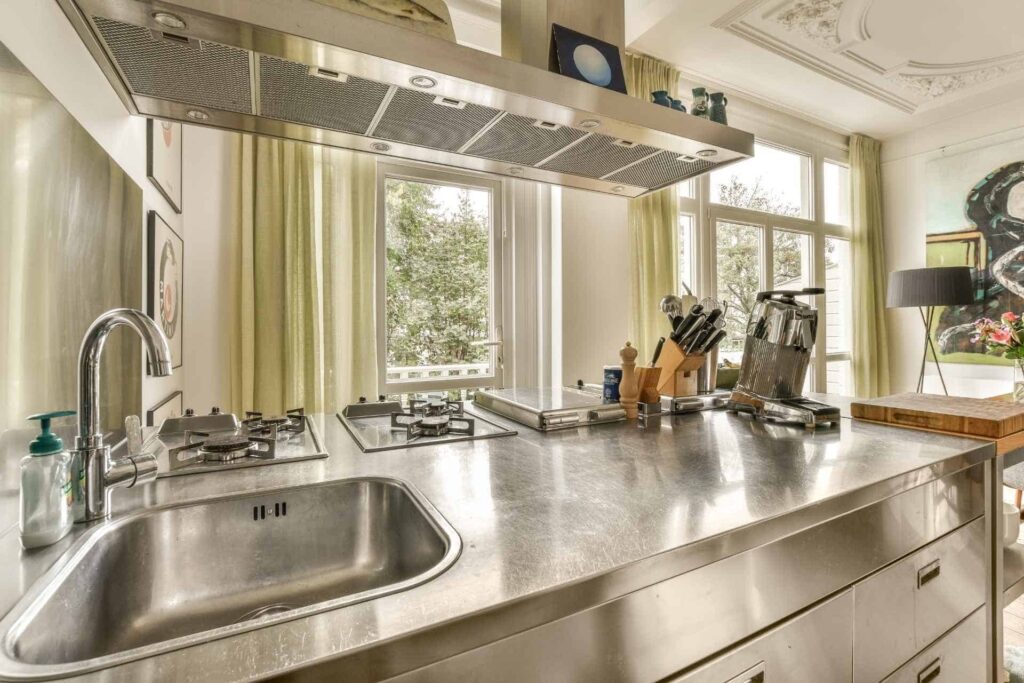
Stainless steel countertops are a popular choice for modern and industrial-style kitchens. They provide a sleek, high-gloss surface that’s both durable and easy to clean.
Advantages and Disadvantages
One of the main advantages of stainless steel countertops is their resistance to heat, stains, and water, making them highly durable. They also offer a sanitary surface as they do not harbor bacteria or viruses. However, they can be prone to scratches and fingerprints, and their modern look may not suit all kitchen styles. They can also be quite loud when pots, pans, or utensils are placed on them.
How to choose the best Stainless Steel kitchen countertops
When selecting a stainless steel countertop, it’s important to consider the gauge of the steel. A lower gauge means thicker steel, which is more resistant to dents and scratches. Opt for a brushed or satin finish to help hide any wear and tear. As with any other countertop material, it’s crucial to buy from a reputable manufacturer to ensure the best quality.
Concrete Countertops
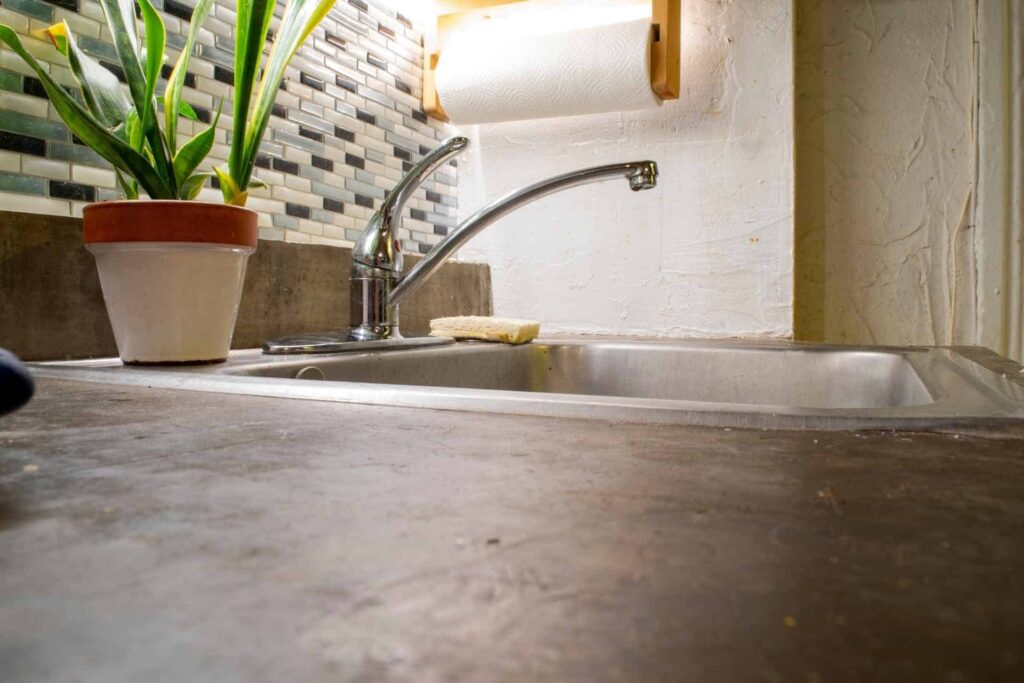
Concrete countertops are known for their versatility and durability, making them an ideal choice for a variety of kitchen styles. They offer a unique, raw aesthetic that can be tailored to suit your specific design preferences.
Advantages and Disadvantages
Among the many advantages of concrete countertops is their customizability. They can be cast in any shape and tinted with any color, providing endless design possibilities. Additionally, they are highly durable and, when properly sealed, can resist heat, scratches, and stains. Despite these benefits, concrete countertops have their drawbacks. They require regular sealing to prevent water and stain absorption. They may also develop small cracks over time due to concrete’s natural tendency to shrink as it dries.
How to choose the best Concrete kitchen countertops
When choosing concrete countertops, consider factors such as the quality of the concrete mix, the color and texture, and the sealer used. Ensure the provider uses a high-quality, crack-resistant concrete mix. Also, while concrete can be colored in a variety of shades, be aware that the color may change over time due to patina and wear. Lastly, make sure the countertop is sealed with a high-quality sealer to ensure its longevity and resistance to stains and water damage. As always, it’s recommended to purchase from a trusted manufacturer to guarantee the quality of your countertop.
Laminate Countertops
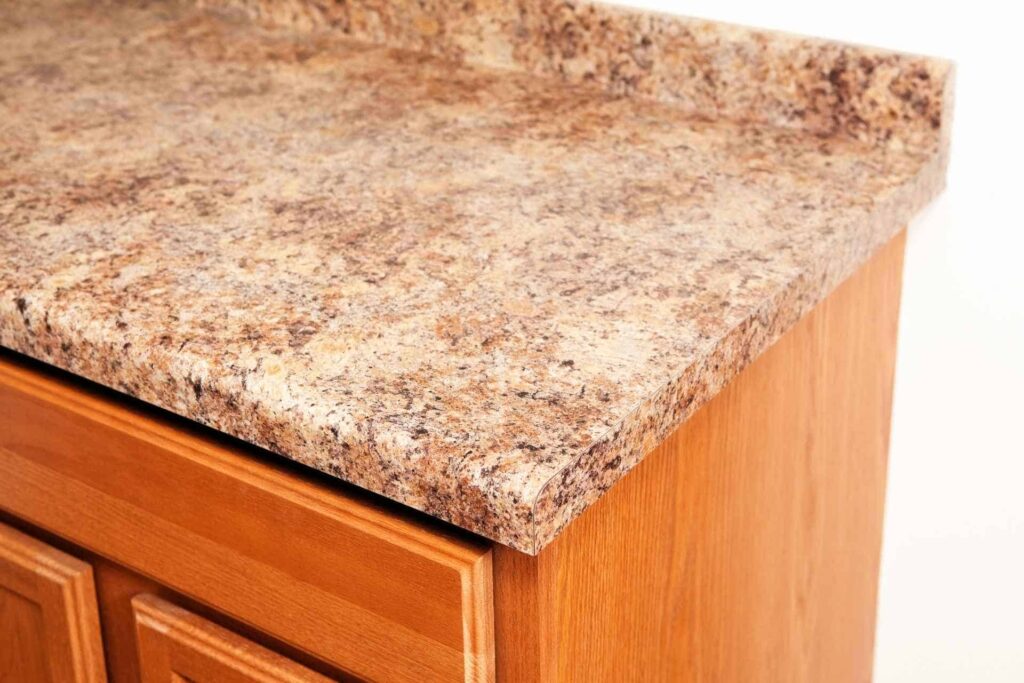
Laminate countertops are a popular choice for kitchens due to their cost-effectiveness and wide array of design options. Laminate is a synthetic material made of layers of plastic bonded to particleboard or kraft paper to create a solid countertop surface.
Advantages and Disadvantages
Laminate countertops come with their own set of advantages and disadvantages. They are extremely affordable and available in a vast range of colors, patterns, and finishes, including designs that mimic the look of wood, stone, and other natural materials. They resist heat and impact and are easy to clean. On the downside, laminate countertops can scratch and chip, and, unlike other countertop materials, they cannot be repaired once damaged. They also have a shorter lifespan compared to materials like concrete or natural stone.
How to choose the best Laminate kitchen countertops
Choosing the best laminate countertops involves considering the quality of the laminate, color, pattern, and edge style. Quality is determined by the thickness of the laminate and the reputation of the manufacturer. The color and pattern should match your kitchen decor, and the edge style should suit your design preference. Since laminate countertops cannot be repaired once damaged, it’s crucial to choose a durable product from a reputable manufacturer.
Recycled Glass Countertops
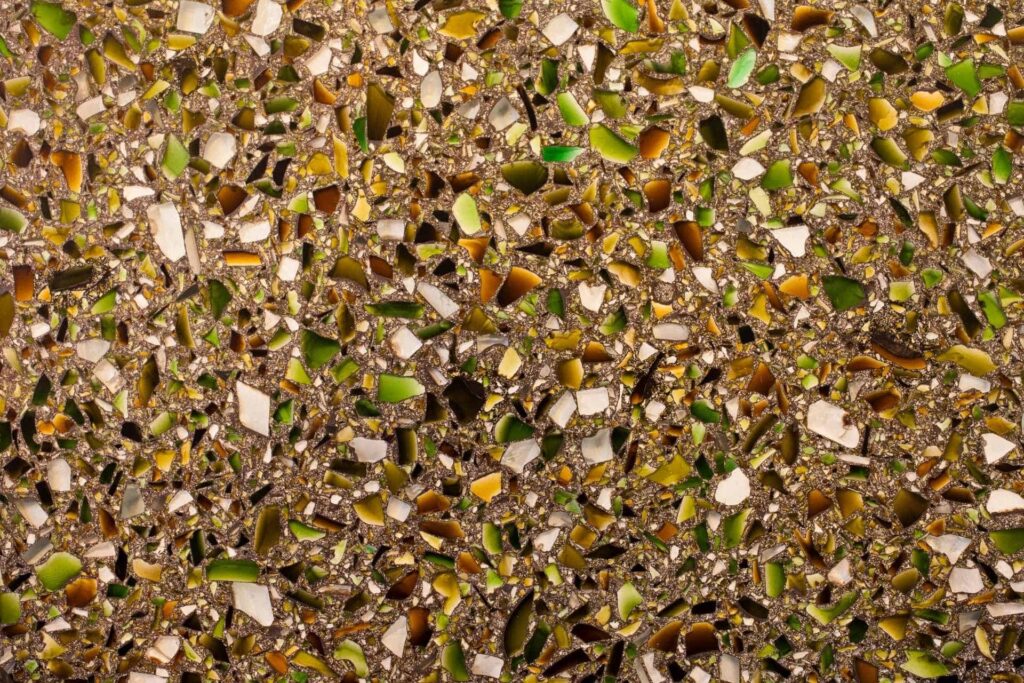
Recycled glass countertops are an eco-friendly and visually appealing option for your kitchen. As the name suggests, these countertops are made from a blend of recycled glass shards set in a resin or concrete base.
Advantages and Disadvantages
Like other countertop materials, recycled glass countertops have both advantages and disadvantages. On the positive side, they are environmentally friendly, durable, and unique in appearance with a mosaic-like finish that can be customized to fit any kitchen design. In terms of heat-resistance, they perform well, but it’s always recommended to use heat pads or trivets. However, on the downside, recycled glass countertops can be prone to chipping, especially around the edges. Some may find the surface a bit uneven due to the glass shards, and they are higher in price compared to options like laminate.
How to choose the best Recycled Glass kitchen countertops
When choosing the best recycled glass countertops for your kitchen, consider factors like the size of the glass shards, base material (concrete or resin), and color to match your kitchen decor. Also, ensure the countertop is sealed properly to prevent stains and consider purchasing from a manufacturer who offers a warranty. Like all countertop choices, regular maintenance will help ensure longevity and preserve the beauty of your recycled glass countertop.
Conclusion
Selecting the best kitchen countertops involves a thorough assessment of your needs, lifestyle, aesthetic preferences, and budget. Whether you choose granite, quartz, recycled glass, or laminate, each material has its unique set of benefits and potential drawbacks. If sustainability is your top priority, recycled glass countertops might be the best fit. For durability and heat-resistance, granite or quartz would be better options. Always consider the maintenance required for each type, as some materials may require more frequent upkeep. Kitchen countertops are a significant investment, so it’s vital to make a well-informed decision. Consulting with a professional can provide valuable guidance and ensure that you select the countertop material that best suits your home, your style, and your cooking habits. Remember, the perfect countertop not only complements your kitchen’s overall design but also enhances your cooking experience and lifestyle.

